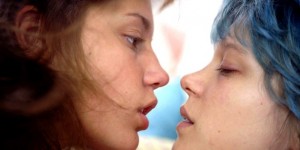STUDIO: Criterion| DIRECTOR: Abdellatif Kechiche | CAST: Léa Seydoux, Adèle Exarchopoulos, Salim Kechiouche
RELEASE DATE: 2/25/13 | PRICE: DVD $19.95, Blu-ray $24.95
BONUSES: essay by B. Ruby Rich
SPECS: NC-17 | 179 min. | Foreign language drama romance | 2:35 widescreen| Dolby Digital 5.1 | French with English subtitles
RATINGS (out of 5 dishes): Movie
| Audio
| Video
| Overall
If ever a film could be described as both impressively intense and curiously mellow in a narrative sense, it would be the arthouse hit Blue is the Warmest Color, which won the Palme d’Or at this year’s Cannes Film Festival. Writer-director Abdellatif Kechiche (Games of Loves and Chance) beautifully showcases the terrific work done by his two lead actresses — who, in an unprecedented step, were awarded the Palme d’Or along with him. He also curiously skips from event to event in the film, never adequately establishing the aging of the lead characters as reflected in the basic storyline.
The film revolves around Adèle (Adèle Exarchopoulos), a high school student whose life is changed forever when she realizes she is gay and embarks upon a deeply passionate relationship with Emma (Léa Seydoux, Mysteries of Lisbon), a painter in her early twenties. As the film moves on, we see Adele being swept away by the exuberance of first love and the intoxication of a strong sexual attraction.
Throughout the film one is struck by the excellence of Exarchopoulos’ performance. She beautifully incarnates a 15-year-old who ages several years during the course of the film (how many years is never made clear). She perfectly conveys the awkwardness of a teenager dealing with her newfound sexual identity and, later, the lovesicknesss of a young woman still haunted by a breakup she never wanted (but which was seemingly preordained).
Kechiche does blur the timeline of his tale (which was based on a graphic novel by Julie Maroh). Despite this, Exarchopoulos and Seydoux do superb jobs at incarnating school girls who have become career women by the film’s end. Seydoux lends layers of depth to Emma, but the film is indeed Adèle’s show from start to finish.
And then there are much-discussed sex scenes. It’s possible to envision an American equivalent of Blue’s coming-out/coming-of-age scenario, but it’s very hard to imagine one with the kind of intense sex scenes included here, especially because Exarchopoulos’s character is initially under-aged (the actress was actually 19 at the time of the shoot).
The two stars revealed in interviews that they were wearing “fake” vaginas molded from their real genitalia, and that Kechiche spent ten days to shoot the film’s central sex scene. There is a narrative purpose for the sex in the film, however, most notably to convey Adèle’s feverish sexuality. The inclusion of these moments also most certainly helped make the film into the arthouse hit it became.
The only downside to this package is that it is one of the few Criterion releases that lacks any on-screen supplements; an essay by B. Ruby Rich contained in the booklet mentions a “coming full edition” of the film. One will thus have to wait to hear Kechiche’s comments on the picture. Interviews with the actresses will most surely be even more enlightening, as they have publicly spoken about how they felt they mistreated by him over the course of the film’s five and a half month shoot.
In fact Seydoux said in interviews like this one that making the film was a “horrible” experience; both actresses publicly proclaimed that they would never work with Kechiche again. These negative feelings in fact serve to make the actresses’ achievements even more impressive. In spite of whatever Kechiche put them through on the set — or perhaps because of it — they did some superb work in this moody and affective love story.
|
Buy or Rent Blue is the Warmest Color
|
|||
|---|---|---|---|
DVD |
 DVD | Blu-ray DVD | Blu-ray |
 DVD | Blu-ray DVD | Blu-ray |
|

Leave a Reply